Paulette Goodman
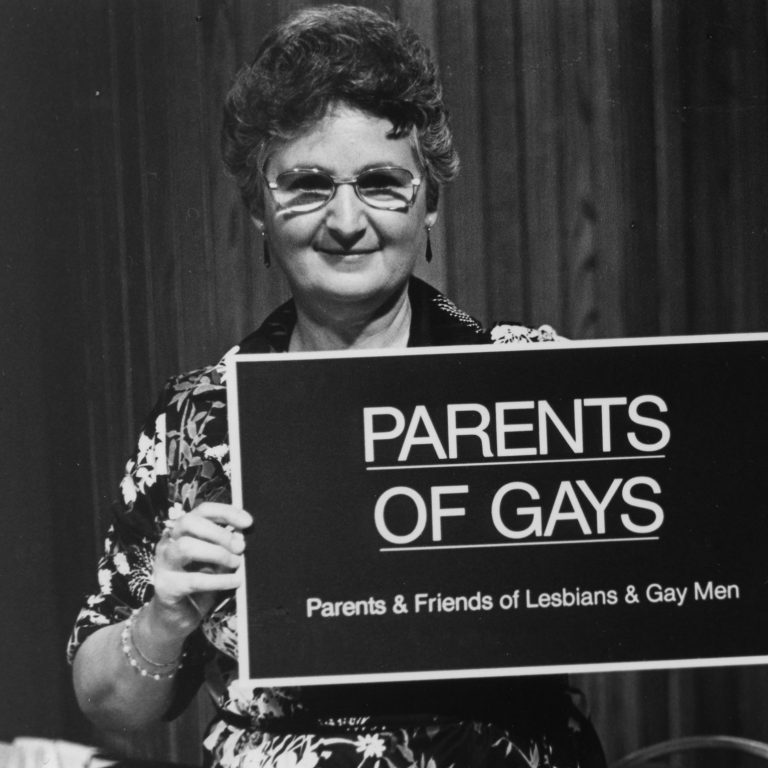 Paulette Goodman at the 5th annual Gertrude Stein Democratic Club Banquet, April 27, 1985. (The Gertrude Stein Democratic Club is Washington, D.C.'s largest LGBTQ political organization.) Credit: Photo by Doug Hinckle/ Washington Blade.
Paulette Goodman at the 5th annual Gertrude Stein Democratic Club Banquet, April 27, 1985. (The Gertrude Stein Democratic Club is Washington, D.C.'s largest LGBTQ political organization.) Credit: Photo by Doug Hinckle/ Washington Blade. Episode Notes
Paulette Goodman’s experience of growing up as a Jewish child in Paris during the Nazi occupation gave her a unique perspective as the parent of a gay child who faced discrimination in the country where Paulette’s family sought refuge. Paulette knew what it meant to be different, to be demonized, and to have your life threatened because of who you are. And she brought all that experience to bear in her work with PFLAG (formerly known as Parents, Families, and Friends of Lesbians and Gays).
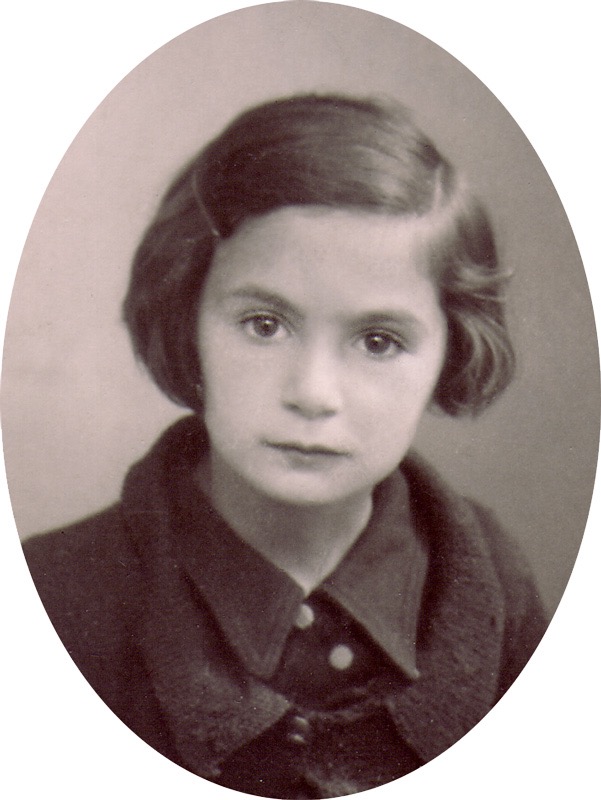
During Paulette’s years heading PFLAG’s Washington, DC, chapter and subsequent tenure as president of PFLAG National, from 1988 to 1992, she used her powers of persuasion, the media, and her standing as a gray-haired mom to carry the ball forward in the fight for LGBTQ equal rights.
To learn more about Paulette’s role in the movement, have a look at the information, links, photographs, and episode transcript that follow below.
———
For a quick summary of Paulette Goodman’s work with PFLAG and numerous honors, have a look at her Wikipedia entry. Read a profile of Paulette in this Atlantic article.
In 1992 Paulette gave a speech on “Why Our Kids Need Civil Rights” to the City Club of Portland, Oregon. Have a listen and you’ll see why Paulette was such an effective advocate..
You can find Paulette Goodman’s oral history in the first edition of the Making Gay History book (titled Making History).
For more information about PFLAG National, visit the organization’s website. We also recommend listening to the Making Gay History episode that features PFLAG co-founders Jeanne and Morty Manford.
Have a look at this collection of PFLAG buttons and photos covering the period from 1972 to 1992.
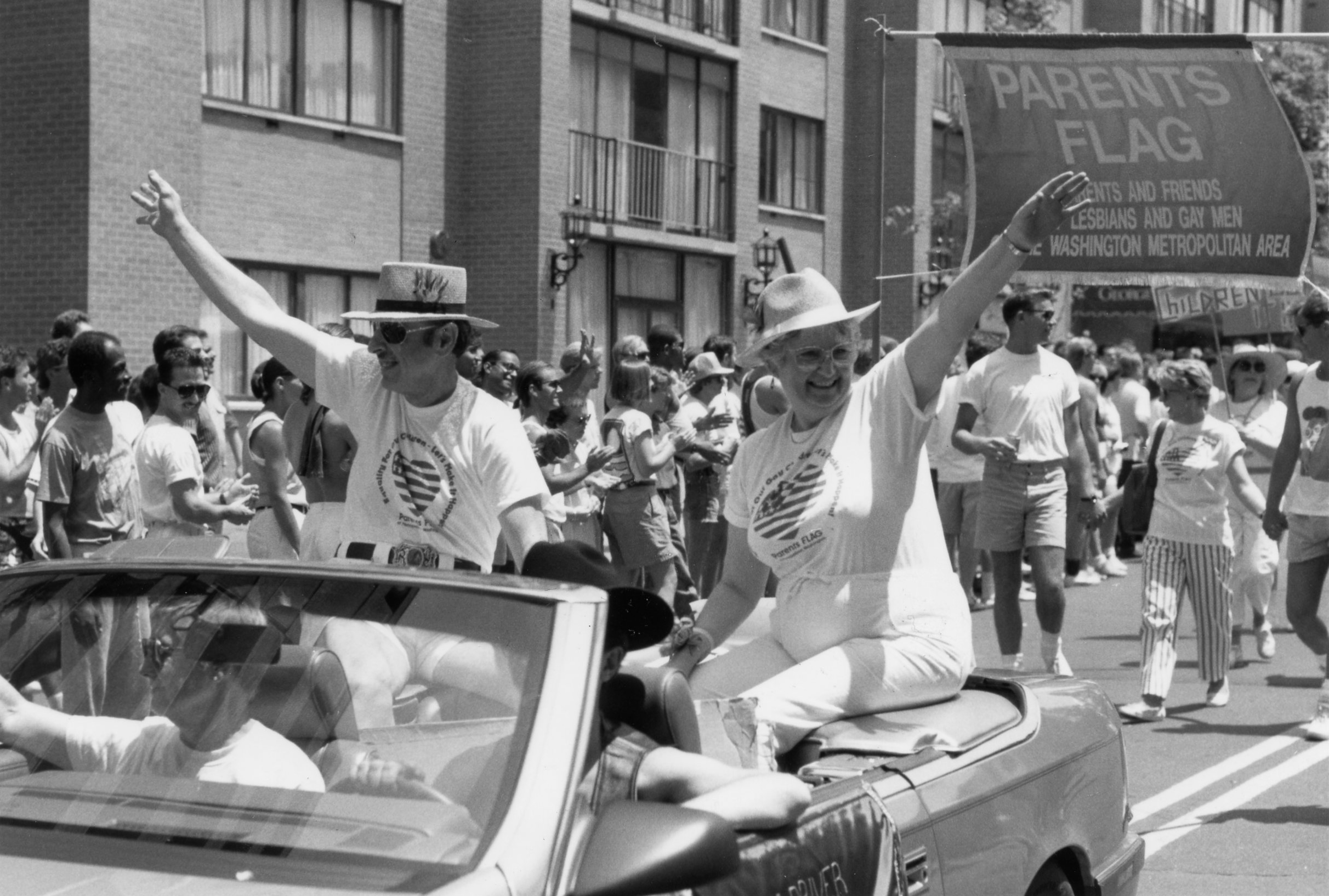
In the conclusion to Paulette’s Making Gay History episode, we mention a letter that Paulette wrote to First Lady Barbara Bush. Here’s what Paulette wrote:
Dear Mrs. Bush:
I am writing to you, as one mother to another, on the 20th anniversary of the Stonewall Inn incident. This date is significant to gay Americans and their families. It marks the painful experience of harassment and violence by the New York City police against law-abiding gay people. The brave resistance of those people was the beginning of a movement for change and the demand for equal rights for all citizens, including homosexuals.
As the parent of a gay child, and because of my work with gay people and their families since 1981, I know firsthand how homophobia and discrimination have affected our lives. We have all grown up with many myths and misconceptions about homosexuality and this creates innumerable problems in our society. We who have lifted the veil of ignorance, however, know that our gay and lesbian children are fine, responsible, contributing members of our communities. They deserve our love and support. They also deserve full human and civil rights and the respect accorded all citizens.
Families are often overwhelmed when confronted by the issue of homosexuality. The suffering we experience due to our prejudice toward gay men and lesbians is unnecessary and disrupts family life. It is estimated that one family in four is touched by a gay person. We and our gay loved ones would certainly appreciate a kinder and gentler America.
We need to educate the public with the facts that are now available. There have always been homosexual people, and there always will be. They do not choose their sexual orientation any more than you or I do. They contribute to the rich fabric of life and are an integral part of it.
These lesbian and gay people are members of our families and we love them. We must show the human face of homosexuality, and you, dear Mrs. Bush, can help us dispel the myths. Positive words from important and respected people in government would go a long way to change negative attitudes and stop violence and hysteria in our society.
I am not a registered Republican, but you won my heart during the President’s inaugural ceremonies. Your warm, no-nonsense approach to life is quite refreshing.
I have read and heard many wonderful things about you. You are a powerful role model as a mother and grandmother. You are loving and compassionate. We need you to speak kind words to some twenty-four million gay Americans and their families, to help heal the wounds, and to keep these families in loving relationships. We will be forever grateful to you.
Respectfully, Paulette Goodman, National President, PFLAG
Three weeks later, Paulette received the following response from Barbara Bush:
Dear Mrs. Goodman,
Thank you so much for your letter and for sharing your work with the Federation of Parents and Friends of Lesbians and Gays, Inc. You sound like a caring parent and compassionate citizen.
I firmly believe that we cannot tolerate discrimination against any individuals or groups in our country. Such treatment always brings with it pain and perpetuates hate and intolerance. I appreciate so much your sharing the information about your organization and your encouraging me to help change attitudes. Your words speak eloquently of your love for your child and your compassion for all gay Americans and their families.
With all best wishes.
Warmly, Barbara Bush
In a subsequent June 26, 1990 New York Times editorial, PFLAG vice-president Robert Bernstein addressed the right wing backlash against Barbara Bush for what she wrote.
Paulette Goodman was honored in 2013 at a party on the occasion of the 30th anniversary of PFLAG’s Metropolitan Washington, D.C., chapter. Read about the event and see photos here.
Paulette Goodman died on August, 15, 2021.
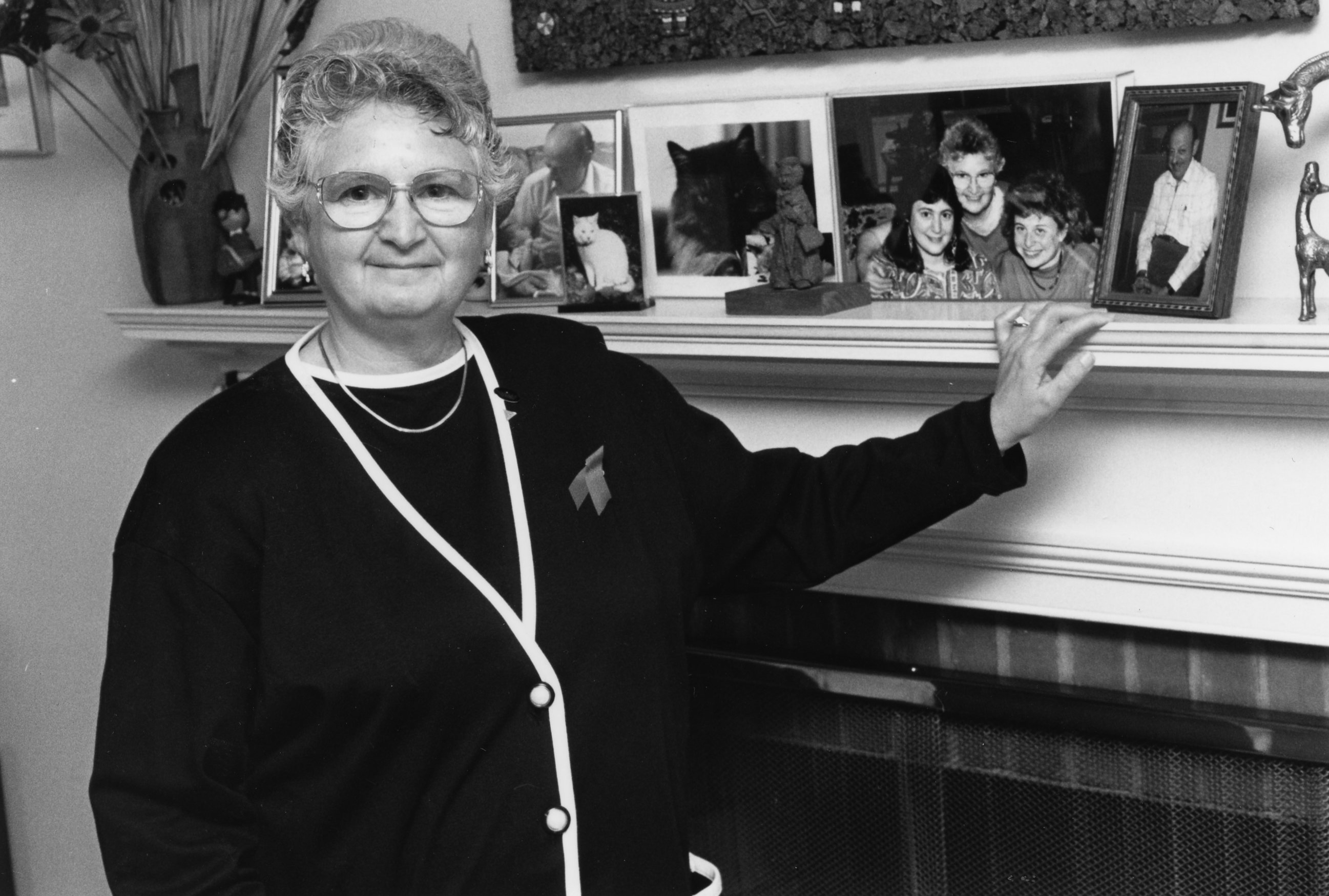
———
Episode Transcript
I’m Eric Marcus and this is Making Gay History!
I admit that I’ve got a soft spot for PFLAG parents. PFLAG is the organization originally known as Parents, Families, and Friends of Lesbians and Gays. The first people I interviewed for my first book more than 30 years ago were a powerhouse PFLAG couple, Amy and Dick Ashworh. And one of PFLAG’s founding mothers, Jeanne Manford, was already one of my heroes long before I started work on my oral history book about the LGBTQ civil rights movement. You can hear Jeanne and her son Morty’s story in our first season.
So is it any wonder when I met Paulette Goodman at a PFLAG fundraiser in San Francisco in 1989 that I fell for her hook, line, and sinker? And it wasn’t just that Paulette was a PFLAG mom. It was her back story that got to me, too. I was raised in a neighborhood in Queens, New York, filled with Jewish refugees from Germany and Austria who fled before the war or survived the Holocaust. Paulette had a survivor story of her own.
So here’s the scene. I arrive at Paulette’s tidy ranch house in Silver Spring, Maryland on a cold December evening. It’s one of those days when I’ve scheduled back-to-back interviews and had to skip lunch. So I’m not just cold. I’m hungry. Thankfully, Paulette has set out snacks on the dining room table. She introduces me to her husband, Leo, who retreats to the kitchen to prepare dinner. I’m hoping they’ll invite me to stay.
Paulette is my idea of a picture-perfect Jewish mother: warm, full-figured, a crown of gray hair, and very concerned that I have enough to eat. While my mind is clearly on food I force myself to focus on why I’m sitting at Paulette’s dining room table. I pull my clipboard from my backpack with the questions I’ve already prepared and get my tape recorder set up so it doesn’t separate me from the snacks. I clip one microphone to my sweater and another to Paulette’s blouse and press record.
———
Interview with Paulette Goodman, Friday, December 15, 1989, 4:30 p.m. Location is the home of Paulette Goodman in Silver Spring, Maryland. Interviewer is Eric Marcus. Tape one, side one.
Eric: So I’d like to start with a simple one. When were you born?
Paulette: In 1933.
Eric: And what part of the world?
Paulette: In Paris, France.
Eric: What was life like for you during the war?
Paulette: We were Jews. We were made to wear the Star of David on our clothing. My best friend called me, “You dirty Jew,” yet she wouldn’t let somebody else call me that. But you know how kids are. Just like, “You queer. You faggot.” The same thing. We knew that we weren’t supposed to be in any public place.
Eric: Why not?
Paulette: You know, in France, the school week. Thursday you had the day off. And on Thursdays, that was children’s time to go to the movies. Jews were not allowed in movie houses.
Eric: Why not?
Paulette: Why not? Because that was decreed by the Germans. And so if you wore your Star of David, you knew you weren’t supposed to be there, so we would take off our Star of David under threat of, you know, being found out and the whole family would have been wiped out.
Eric: Weren’t you frightened doing that as a kid? Or kids are kids and you don’t…
Paulette: You’re kind of uptight about it. You knew that things were happening. And especially since 1942, I think, my sister, her husband, and their four- year-old child were picked up and taken to concentration camp. So the police and the Gestapo went to my sister’s home. And that very same day they took both my sister and her husband.
My sister was a French citizen. My brother-in-law was born in Poland. He was not a French citizen. And I think they were rounding up the non… what they called the aliens, the non-French people. The following morning, my aunt, who lived in the neighborhood, was supposed to go visit my sister. And she did and she found out what happened. My sister had begged, had pleaded, to leave the little boy with the concierge, you know, the super of the building.
Eric: Because they didn’t want the child. They just wanted the two of them.
Paulette: Well, they wanted the three of them, but my sister knew that if they took the little boy…
Eric: He would be killed.
Paulette: I mean, we knew by that time what was going on.
Eric: Oh, god.
Paulette: So she begged. And she left my nephew. The next day my aunt went and heard what happened and I don’t know why she didn’t bring the little boy home—maybe the concierge wouldn’t give him to her. But then my mother sent my sister Gabby to pick up André. And as they were walking back towards our neighborhood they were followed by the police and the Gestapo.
They followed her to our apartment. And she came up with the two French policemen. The Gestapo stayed downstairs. And they told, “Mrs. Rosenberg, Madame Rosenberg, you will have to let this little boy go with us, because his mother is asking for him.” And my mother says, “If my daughter did not take the child yesterday, that means she doesn’t want him to be there. And I have brought up nine children and I can bring up a tenth. Please leave me my grandchild.” This was her first grandchild.
She tore her hair out. I mean, she made such a scene. And we were there in the kitchen when that happened. You know, I remember everything that happened. And they said, “Look, you better quiet down and you better let the child go, because if you don’t, there are those two Gestapo downstairs, they’ll come up and they’ll take all of you with all the children.”
So, they had no choice. They took my nephew and he was reunited with my sister. And I think they spent several months in Rency, which was a camp right outside of Paris. And we did get a couple of letters. You know, threw the letters over the wall. We even sent some packages, whatever my mother could get a hold of to, you know, some food in that camp. And then we knew they were sent to Auschwitz. And we never heard from them again.
So that’s the background. Now, I know what it’s like to be in the closet. I know what it’s like to be a minority, to be threatened. I lost most of our family except for my immediate brothers and sisters. One, my older sister, never came back. But aunts and uncles, cousins, people whom I never knew who lived in Poland were all exterminated.
Eric: Why did your family leave France? You survived the war, miraculously.
Paulette: My parents felt that they never wanted us to go through this experience again.
Eric: What year did you move to the United States?
Paulette: 1949.
Eric: When I heard you speak recently you talked about the whole notion of freedom coming to the United States. Did you feel that at the time?
Paulette: Oh, yes. We wanted to live in freedom and safety.
Eric: And that’s what the United States represented?
Paulette: Yes. Yes. My parents had loved France. I don’t think they would have ever left if it weren’t for, for the children, really, wanting to, to have a new life for us.
Eric: A safe life.
Paulette: A safe life.
Paulette Goodman interview. Tape two, side one.
Eric: Okay. Yes, so, no, my sister was not expecting me for dinner. She did not invite me for dinner.
Paulette: Alright, so I’m glad that I invited you.
Eric: Thank you. I was starved. Because I missed lunch, too.
Paulette: Oh my, you should have said something right away.
Eric: Well, that’s… I had plenty of crackers to nibble on.
Okay. Let’s jump many years later now. Your son is gay. Correct?
Paulette: Uh, uh.
Eric: Your daughter’s gay.
Paulette: Uh, huh.
Eric: I couldn’t remember when you spoke which it was.
Paulette: I said, “My child,” because she’s not comfortable with my… You know, she feels that if I, if I talk about her it’s invading her privacy so… Because I’ve been so public, I say, “My gay child.” And it’s interesting that the press picks up “gay son” right away.
Eric: And I do, too. You’re right.
Paulette: This is her picture. This was taken last April, her 29th birthday.
Eric: She’s my age. Well, a year younger.
So what I’d like to do then is jump to when you first became aware this is an issue in your life.
Paulette: Well, my daughter had been dating since she was 15 and a half. The young man was seven years older than she was and he became a friend of the family. They seemed to be compatible—similar interests in music and writing and all that. And he was dating her until her second year in college. And there she fell in love with a young woman and that was the end of that relationship. So when we moved here…
Eric: You didn’t know about this though.
Paulette: Uh, uh. When we moved here he wrote me a letter saying that she had a very special friend at school and he thought it was more than a friendship.
Eric: Oh, boy.
Paulette: So, we all started to go—but I never said, breathed a word of it to Leo. First, I thought it’s a phase she’s going through. She’ll meet the right fellow and things will be different. It’s none of my business. And I didn’t know quite how to deal with it.
Finally, nine months later, I told Leo about what the young man had written. And he said, “So what?” [Laughs.] So, I was relieved. Three months after that she came home for summer vacation. And I sensed that she had come out to her dad that day ‘cause she wanted to go for a ride with him. And when she came home I was furious. I was so angry.
Eric: Why?
Paulette: Because I felt she didn’t trust me. I was hurt. You know, I’m her mother. I love her.
Eric: So she came home and you were furious. What did you say?
Paulette: I confronted her. And then we started to talk. She was crying. And she said the only reason was she thought I’d never understand. She was afraid I, you know, wouldn’t let her finish school, uh, we would cut her off.
Eric: It must have made you feel terrible finding out that she was so afraid of what you might do to her.
Paulette: That’s right. You know, here is a mother, a devoted loving parent and a child is just afraid, and can’t come to you. I think that’s a terrible thing. And I was angry with her for not coming out to me. But, you know, since I’ve been involved in Parents FLAG I’ve spoken to a lot of kids on college campuses. We give “Coming Out to Parents” workshops. And many of them say that they’re not ready to come out to the parents and even if the parents confronted them they would deny it. Because they’re not ready. And that’s probably what—so being involved helped me understand my child and, you know, the dynamics of it all.
Eric: In retrospect.
Paulette: Not when it happened.
Eric: No. In terms of your own education, what happened from that time.
Paulette: I heard a public announcement on the radio and the telephone number and I don’t remember exactly how it went, but essentially, “If there’s someone gay in your life, you know, and you have questions, you can call this number.” And I called and I talked to Gene Baker. And he was having meetings at his home at the time in 1981.
Eric: What was the meeting like?
Paulette: There were about three or four parents and a couple of gay men. And we talked and I found it very helpful. And I got hooked into it because I saw that I could help others. And I started having meetings at my home. You know, this was 1982 already.
Eric: What kinds of parents came?
Paulette: What kind of parents came? Parents who just found out they had gay children.
Eric: Your work at this time was social service oriented. At some point you became something of an activist. More polit…
Paulette: Yes. Yes.
Eric: How did that happen?
Paulette: Well, that happened early…
Eric: Because your daughter didn’t ask you to do that. Or did she?
Paulette: No. No. And this happened because in 1983 we became a chapter of Parents FLAG. And late in 1983 in Montgomery County there were people getting together to try to get—to add sexual orientation to the human rights ordinance…
Eric: In Montgomery County.
Paulette: In Montgomery County. And a gay couple, two young men, came to one of our meetings and asked for our help and I testified. There were a lot of fundamentalists in the audience and they made their voices heard. They were saying that such law is not needed on the one hand and then saying bad things on the other. “Put them on an island and nuke them.” And a lot of terrible things were being said. This councilman kept bringing up beastiality. And I was so uptight, so upset. And I really, you know, was in the closet still. It was difficult for me.
Eric: Why did you think the ordinance was necessary?
Paulette: I didn’t know about it and I really had no opinion. But as I went to the hearings and I saw the nastiness, the bigotry, I realized that it was very necessary because there were people out there who would see to—would support a landlord throwing somebody out just on the basis of their gayness. People being denied jobs or being thrown out of their jobs because they are found out to be gay. Wanting to share a room and having difficulties if they’re found out to be gay. So I really felt this was very unfair.
Eric: Did it remind you at all of your experience in Europe in terms of the bigotry?
Paulette: I really felt irked that people should be discriminated against. You know, this never sat with me very well. I didn’t see why my child should be considered less a person than my non-gay child. I really, you know, I’m a maverick. These injustices never sat with me very well.
Eric: You didn’t just come out of the closet in a little way, you went…
Paulette: Yeah, with a bang. You know what I say when I speak now?
Eric: What?
Paulette: I’ve been doing it with a vengeance ever since. It was the best thing that ever happened to me because I was boiling inside, I was so stifled. My sense of justice is very strong and I felt I wanted to speak. Here this was a new organization. I was the head of it. And how could we reach out to people if I was not able to, to speak openly? And so it was very liberating.
But after I became liberated I really found a great deal of satisfaction in speaking out. And I also found that because of my reasonableness, being a parent, having grey hair, people listen to what I have to say, respected what I said. And I was believable to a lot of people. And then knowing that this was helping families meant a great deal to me. And there’s nothing like knowing that you are doing something for someone to get you hooked, you know.
Eric: When you say liberating, how do you mean? What was the feeling?
Paulette: The feeling? To be, to be free to, to speak. I did fear for a while, you know, you never know what kind of nuts are out there. They might throw a bomb at my house or something. You know, you are fearful. And then I realized that if I didn’t conquer that fear, I just couldn’t function. And then I decided I’ll have to take my chances. It’s better than to be afraid.
But I do know from experience, parents who speak out or who advocate on behalf of their children are very, very strong advocates. Any time that parents will take up the cause for their children they will succeed.
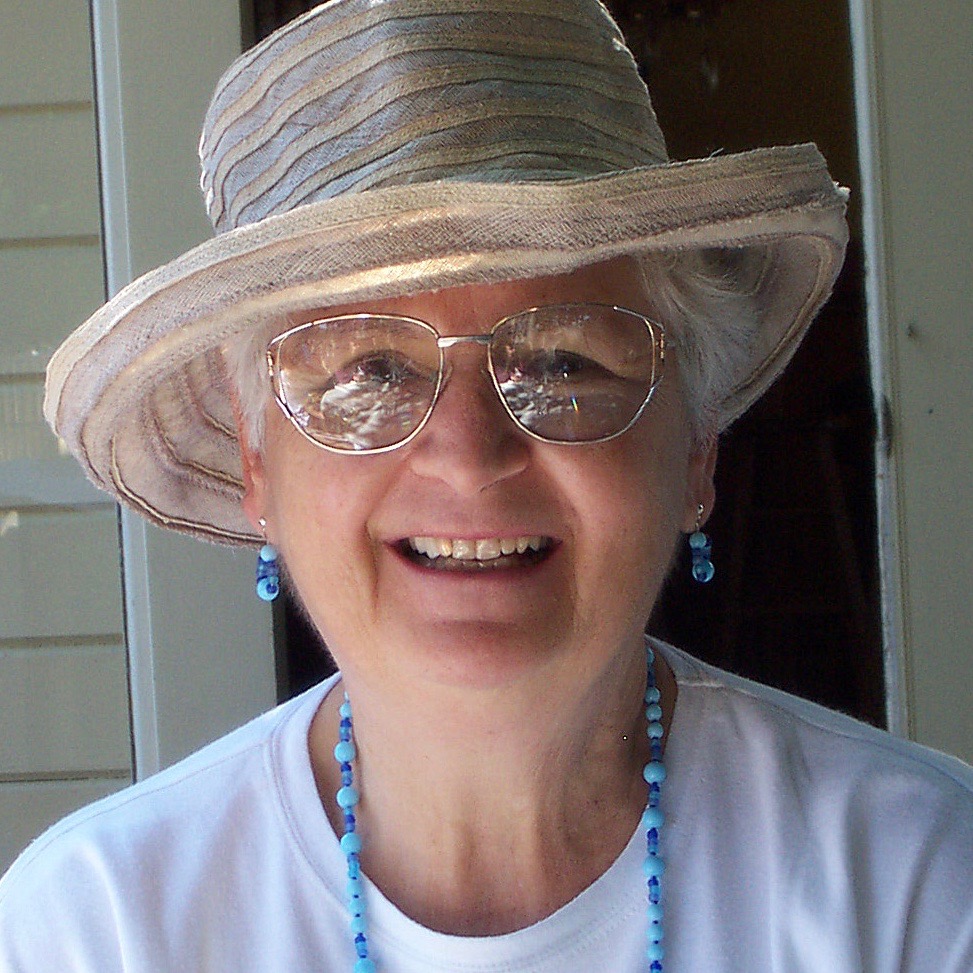
———
When Paulette Goodman told me about her daughter’s discomfort with her mother’s activism, I didn’t feel particularly sympathetic toward her daughter. What I wouldn’t have given for my mom to be a proud PFLAG parent fighting for my rights. Well, a few years later I got my wish… and developed some sympathy for Paulette’s daughter. My own mother became a staunch PFLAG parent who championed the cause. On more than one occasion, rather unkindly now that I look back, I reminded my mother that I was the gay one. It can be challenging when your parent takes up what you think of as your fight and does it in a big way.
But Paulette made an important point about what parents could get done that we couldn’t. During the four years Paulette was PFLAG president, from 1988 through 1992, and certainly in the years before that, parents got listened to. They couldn’t be dismissed like I could simply because I was gay. Paulette and all PFLAG parents were and are fierce advocates for LGBTQ people. My own mother is long gone, but if she were here I’d tell her how proud I am these days of the work she did as a passionate PFLAG parent.
One thing that Paulette accomplished during her time as PFLAG president made national news. She wrote to First Lady Barbara Bush, mother to mother, asking for words of support for the nation’s gay children and their families. And she got those words in the form of a personal note from Barbara Bush that got picked up by the Associated Press. It’s hard to imagine now the impact of the First Lady’s words of support, but after eight years of the Reagan presidency and one year of the Bush presidency when the White House virtually ignored gay people, it was historic. You can read Paulette’s letter and Barbara Bush’s response in the episode notes at makinggayhistory.com.
I spoke with Paulette just a few days ago. She’s 84, widowed, and lives at the Riderwood Retirement Community in Silver Spring, Maryland. Paulette told me that she was having knee replacement surgery just a couple of days before we planned to post her episode. Paulette, I know you’ll be listening, so please know that all of us at Making Gay History are wishing a speedy and full recovery.
Making Gay History is a team effort. Thank you to executive producer Sara Burningham and audio engineer Anne Pope. We had production assistance from Josh Gwynn. Our theme music was composed by Fritz Myers. Thank you, also, to social media strategist Will Coley, webmaster Jonathan Dozier-Ezell, researchers Bronwen Pardes and Zachary Seltzer, and photo editor Michael Green. A very special thank-you to our guardian angel Jenna Weiss-Berman.
The Making Gay History podcast is a co-production of Pineapple Street Media, with assistance from the New York Public Library’s Manuscripts and Archives Division and ONE Archives at the USC Libraries.
Season three of this podcast is made possible with funding from the Ford Foundation, which is on the front lines of social change worldwide.
And if you like what you’ve heard, please subscribe to Making Gay History wherever you get your podcasts. You can also go to makinggayhistory.com. That’s where you’ll find all our episodes, including photographs, notes, and links to additional information about all the people we feature in Making Gay History.
So long! Until next time!
###